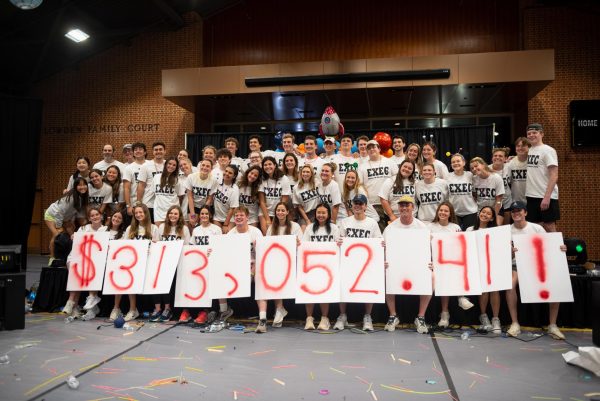Vulgar fraternity email sparks mass outrage
An email sent to rushees of a blacklisted fraternity referred to sorority women unflatteringly
A recent email from the Delta Kappa Epsilon (DKE) fraternity made its way throughout campus as the message contained disturbing and sexual language, leading to pushback.
October 28, 2021
Correction/Update:
An earlier version of this story incorrectly attributed the email about a “Dump basement” event to Sigma Alpha Epsilon, when in fact it was sent out by Sigma Chi. Additionally, the story has been updated to include new information obtained by the Old Gold & Black since publication.
As the night of Friday, Oct. 22 approached, the brothers of Delta Kappa Epsilon (DKE) were preparing for their annual “Heat” party, which features a massive indoor pool. That was, until a vulgar email sent to the fraternity’s rushees went public.
“If the idea of binge drinking while floating around in an indoor pool doesn’t get the blood flowing to your little [expletive]the chicks (sic) in bikinis and wet t-shirts wrestling around in the water will,” the email to the rushees read. “Seriously, there’s something about Heat that makes girls throw all their morals and self-respect out the window.”
Many students expressed disdain for the email as it was spread on social media sites like Instagram. Like others, senior Caroline Wright said she was “disgusted” but not surprised. Many took the email as an opportunity to call out the role of fraternities in promoting sexist violence writ large.
“I’m so angry at DKE for sending that email, and I know they’re only getting heat because they were caught,” sophomore Nina Nichols said. “I know that other frats send out similar emails.”
Nichols continued: “I hope that other frats take this as a sign to do and act better and more respectfully to the women that attend their events.”
The email quickly circulated across campus, and many sororities—including Delta Delta Delta, Kappa Beta Gamma and Kappa Alpha Theta — boycotted the event. Later, DKE canceled the party altogether.
“I’m proud of sororities for not taking their [expletive],” freshman Emma Sullivan said.
The Office of Student Engagement also got wind of the email Friday night and contacted the national organization for DKE.
“Our associate dean of students for student conduct sent a response to [DKE’s] HQ via email, and our Associate Dean of Students for Student Engagement left messages on the HQ emergency hotline and their executive director’s cell phone,” Shane Taylor, assistant director of fraternity and sorority life, said.
Taylor continued: “From this communication, the national headquarters informed us the local chapter was canceling the event for the weekend.”
DKE has been on suspension from the university since 2018 due to multiple Code of Conduct violations. Later that year, Wake Forest University Police reported that two instances of sexual assault were reported at the DKE house, according to local news outlets.
Over the weekend and during the beginning of this week, DKE sent out apology emails to sorority chapters on campus. The release of the email was staggered. For example, members of Kappa Kappa Gamma received the email early into the weekend, members of Kappa Beta Gamma received the email Monday night and members of Kappa Alpha Theta received the email on Tuesday afternoon.
“First and foremost, we are terribly sorry for the email that was sent Monday,” the apology email read. “In an effort to drive interest with our rushees we used terms about women that should never be used, and we deeply regret this mistake. As most fraternities do, rush emails are saved over the years and recycled when common parties come up each year, and this email was mainly from a template that had been created years ago to describe HEAT. While this email template has been used throughout the years, it does not represent our current values nor our current beliefs about women, and we should have noticed and corrected this prior to the email.”
The email continued: “It has been our goal since day one to defy the rumors about our organization and be great men that strive for equity for all, and this email goes against our current values and what we have been trying to defy for the past four years. We don’t want to create or suggest that we are an unsafe space for women, and hope that we can gain back your trust in the future. Again, we are really sorry for the lack of consideration in that email– we will continue to educate ourselves to be better citizens and allies to women.”
The apology also mentioned that the email that was sent to rushees was not seen by the executive board and that disciplinary actions are in store for those who wrote and approved the email.
DKE’s apology, however, has some inconsistencies. Copies of past emails about Heat obtained by the Old Gold & Black have similar verbiage but did not contain the parts about sorority women losing morals and self-respect. Further, if the email had been used for five years, then every member of the fraternity would at one point have seen it and known about it, including the executive board.
DKE International, in a later statement about the email, said that the member who sent out the email has been placed on interim suspension amidst an ongoing investigation.
“DKE does not tolerate this kind of behavior in the fraternity and holds its chapters and members accountable,” said DKE Executive Director Doug Lanpher.
This is not the first time an email has landed a fraternity in hot water. Sigma Chi was placed on interim suspension for a derogatory email it sent about one of its parties in 2018.
“Picture this, a thousand virgins named Mary and a bunch of horny college dudes meeting for the first time in the Garden of Eden: Dump basement,” that email read. The Old Gold & Black reported that similar emails had been sent in years prior, much like those sent by DKE.
For many, DKE’s email was a harsh reminder about the dangers of fraternity culture relating to sexist violence.
“The email made me feel less safe going to frats,” one sophomore, who opted to remain anonymous, said.
Frats and Violence
Looking more generally, fraternities can contribute to cultures of sexist violence on campuses. A 2007 study found that fraternity brothers are three times more likely to perpetrate rape than their non-Greek involved peers. The same study found that due to their proximity, sorority women are 74% more likely to be assaulted. These statistics are the basis of efforts to reform fraternity culture at Wake Forest and beyond.
“Our office is working with all organizations to help them come up with actions they can take to build environments where all guests and members feel safe during all social situations,” Taylor said.
After an August protest surrounding issues of interpersonal violence, SAE released a statement to sororities regarding their priorities surrounding issues of interpersonal violence.
“With respect to concerning recent news and past atrocities resurfacing, I wanted to personally reach out and see how everyone is doing,” the statement read. “As a group, we believe that the safety and comfort of all women on our campus is paramount, and we hope that you are all of the opinion that we practice what we preach. With that being said, the past few days have reminded us of the sobering truth that sexual abuse is present on this campus, and it is not limited to one individual, group or grade.”
The statement continued: “Going forward, we will display a heightened awareness on this subject and continue to be proactive in our efforts to mitigate the possibility of a situation that would have anyone feeling unsafe, uncomfortable or in danger. If you see something of … concern, please take it up with a trusted friend in the fraternity, no issue is too small.”
SAE President Cole Kammerer told the Old Gold & Black that his fraternity wanted to put out something proactive after the protest.
“At the beginning of the school year, we recognized what was going on in the community and we wanted to put out a statement before it seemed like something we had to do rather than something we wanted to do,” Kammerer said.
In the aftermath of the protest, stories from a couple of years ago about former members of Alpha Sigma Phi (ASig) who had been accused of sexual assault resurfaced on the social media site Yik Yak.
ASig declined to comment on the accusations themselves but sent a statement to sororities about what they would do going forward, including a full membership review and a new policy of immediate suspension of anyone with an active Title IX case, among other initiatives.
“We acknowledge we must do better as a chapter in terms of how we interact with women,” this statement reads. “It is our utmost priority and responsibility to ensure the safety of everyone who attends our events.”
In the statement, ASig also committed to educating its members on sexual assault and to serving only closed containers of alcohol at their functions to minimize the risk of drugged drinks.
“We released the statement because we take this topic very seriously as a fraternity,” a high-level chapter executive said of the decision to send out a statement. “The changes and subsequent statements were made to ensure to the best of our ability that people feel safe and welcome at our events. We stand by our statement and hope that other organizations are also making changes to make campus a safer place for everyone.”
Taylor said that his office appreciates the ways in which those two fraternities have stepped up on this issue, including the statements.
“We appreciate the initiative our organizations have taken to share a statement about interpersonal violence and the steps they are taking to change the culture at Wake Forest,” Taylor said.
This article is part of a series on fraternities and sexual assault. Stay tuned to future editions of the Old Gold & Black for more.






















